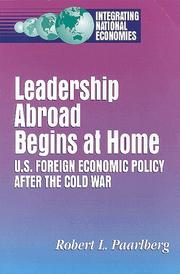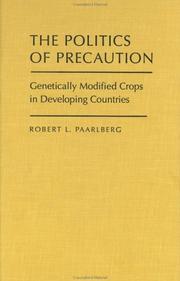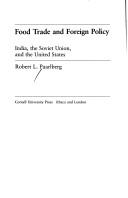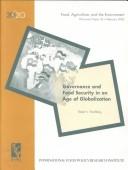| Listing 1 - 10 of 24 | << page >> |
Sort by
|

ISBN: 0815768036 Year: 1995 Volume: *7 Publisher: Washington, D. C. Brookings Institution
Abstract | Keywords | Export | Availability | Bookmark
 Loading...
Loading...Choose an application
- Reference Manager
- EndNote
- RefWorks (Direct export to RefWorks)
338.22 <73> --- 339 (73) --- Economische organisatieleer. Economisch beleid. Economische politiek--Verenigde Staten van Amerika. VSA. USA --- Handel. Internationale economische betrekkingen. Wereldeconomie --binnenlandse als buitenlandse handel; zie ook {339.3} en {339.5}--Verenigde Staten van Amerika. VSA. USA --- 339 (73) Handel. Internationale economische betrekkingen. Wereldeconomie --binnenlandse als buitenlandse handel; zie ook {339.3} en {339.5}--Verenigde Staten van Amerika. VSA. USA --- 338.22 <73> Economische organisatieleer. Economisch beleid. Economische politiek--Verenigde Staten van Amerika. VSA. USA --- United States --- Economic policy --- Foreign economic relations. --- Foreign economic relations --- 1993-2001 --- United States - Economic policy - 1993 --- -United States --- -338.22 <73> --- United States - Economic policy - 1993-
Book
ISBN: 9780199922628 Year: 2015 Publisher: Oxford [etc.] Oxford University Press
Abstract | Keywords | Export | Availability | Bookmark
 Loading...
Loading...Choose an application
- Reference Manager
- EndNote
- RefWorks (Direct export to RefWorks)
Food consumption --- United States --- Energy consumption --- Energy policy --- Obesity --- Medical policy --- Social policy --- Economic policy --- Politics and government

ISBN: 0801866685 0801868238 Year: 2001 Publisher: Baltimore Johns Hopkins university press
Abstract | Keywords | Export | Availability | Bookmark
 Loading...
Loading...Choose an application
- Reference Manager
- EndNote
- RefWorks (Direct export to RefWorks)
Crops --- Basic Sciences. Biotechnology --- Genetic engineering --- Government policy --- Biosafety, Risk Evaluation Bioveiligheid, --- 575.08:577.21 --- 338.439.02 --- Genetic engineering, genetic manipulation, recombinant DNA --- Food policies. Including : targets, programmes --- Biosafety, Risk Evaluation Bioveiligheid,. --- 575.08:577.21 Genetic engineering, genetic manipulation, recombinant DNA --- Agricultural crops --- Crop plants --- Farm crops --- Industrial crops --- Farm produce --- Plants, Cultivated --- Agronomy --- Crop science --- Plant products
Book
ISBN: 9780199322404 0199322406 0199322414 9780199322411 9780199322398 9780199322381 0197569870 9781299781757 1299781756 0199322384 0199322392 Year: 2013 Publisher: Oxford New York
Abstract | Keywords | Export | Availability | Bookmark
 Loading...
Loading...Choose an application
- Reference Manager
- EndNote
- RefWorks (Direct export to RefWorks)
Here, Paarlberg, one of the most prominent scholars writing on agricultural issues, maps out and demystifies the phenomena that newspapers and magazines have variously labeled as causes of the food crisis, often in highly alarmist tones.
Agriculture and state --- Food supply --- Food --- Nutrition policy --- Marketing --- E-books --- Agriculture and state. --- Food -- Marketing. --- Food supply. --- Nutrition policy. --- Business & Economics --- Agricultural Economics --- Food policy --- Nutrition --- Nutrition and state --- State and nutrition --- Social policy --- Foods --- Dinners and dining --- Home economics --- Table --- Cooking --- Diet --- Dietaries --- Gastronomy --- Food control --- Produce trade --- Agriculture --- Food security --- Single cell proteins --- Agrarian question --- Agricultural policy --- State and agriculture --- Economic policy --- Land reform --- Government policy --- matvareindustri --- matvareforsyning --- ernæringspolitikk --- ernæring --- landbruk --- jordbruk --- globalisering --- matvarepolitikk --- matvarer --- 631.17 --- 631.17 Agricultural and farm technology --- Agricultural and farm technology --- Politique agricole --- Aliments --- Politique alimentaire --- Marketing. --- Approvisionnement --- Commercialisation

ISBN: 0801493455 Year: 1985 Publisher: Ithaca Cornell University Press
Abstract | Keywords | Export | Availability | Bookmark
 Loading...
Loading...Choose an application
- Reference Manager
- EndNote
- RefWorks (Direct export to RefWorks)

ISBN: 0815768044 Year: 1995 Publisher: Washington, D.C. Brookings Institution
Abstract | Keywords | Export | Availability | Bookmark
 Loading...
Loading...Choose an application
- Reference Manager
- EndNote
- RefWorks (Direct export to RefWorks)
Book
ISBN: 0525656456 Year: 2021 Publisher: New York : Alfred A. Knopf,
Abstract | Keywords | Export | Availability | Bookmark
 Loading...
Loading...Choose an application
- Reference Manager
- EndNote
- RefWorks (Direct export to RefWorks)
"A bold, science-based corrective to the groundswell of misinformation about food and how it's produced, examining in detail local and organic food, food companies, nutrition labeling, ethical treatment of animals, environmental impacts, and every other aspect from farm to table. Consumers want to know more about their food--including the farm it came from, the chemicals used, the nutrition value, how the animals were treated, and costs to the environment. They are being told that organic foods, unprocessed and sourced from small local farms, do the best in passing such tests. Robert Paarlberg reviews the evidence and disagrees. He finds that global food markets have improved our diet, and that "industrial" farming has recently turned green, thanks to GPS-guided precision methods that are now cutting energy use and chemical pollution. America's serious obesity crisis does not come from farms, or from food deserts, but instead from "food swamps" created by food companies, retailers, and restaurant chains. Animal welfare is lagging behind, but progress can be made through continued advocacy, more progressive regulations, and perhaps plant-based imitation meat. Paarlberg finds solutions that can make sense for farmers and consumers alike. From Farm to Table is a road map through the rapidly changing worlds of food and farming, laying out a practical path to bring the two together"--
Book
ISBN: 0197743781 0197743803 019774379X Year: 2023 Publisher: New York, NY : Oxford University Press,
Abstract | Keywords | Export | Availability | Bookmark
 Loading...
Loading...Choose an application
- Reference Manager
- EndNote
- RefWorks (Direct export to RefWorks)
Here, Paarlberg, one of the most prominent scholars writing on agricultural issues, maps out and demystifies the phenomena that newspapers and magazines have variously labeled as causes of the food crisis, often in highly alarmist tones.
Agriculture and state. --- Food supply. --- Food--Marketing. --- Nutrition policy. --- Food --- Marketing.

ISBN: 0896296423 Year: 2002 Publisher: Washington International food policy research institute
Abstract | Keywords | Export | Availability | Bookmark
 Loading...
Loading...Choose an application
- Reference Manager
- EndNote
- RefWorks (Direct export to RefWorks)
Food supply --- Government policy --- International cooperation
Book
Year: 1999 Publisher: Washington International food policy research institute
Abstract | Keywords | Export | Availability | Bookmark
 Loading...
Loading...Choose an application
- Reference Manager
- EndNote
- RefWorks (Direct export to RefWorks)
| Listing 1 - 10 of 24 | << page >> |
Sort by
|

 Search
Search Feedback
Feedback About UniCat
About UniCat  Help
Help News
News